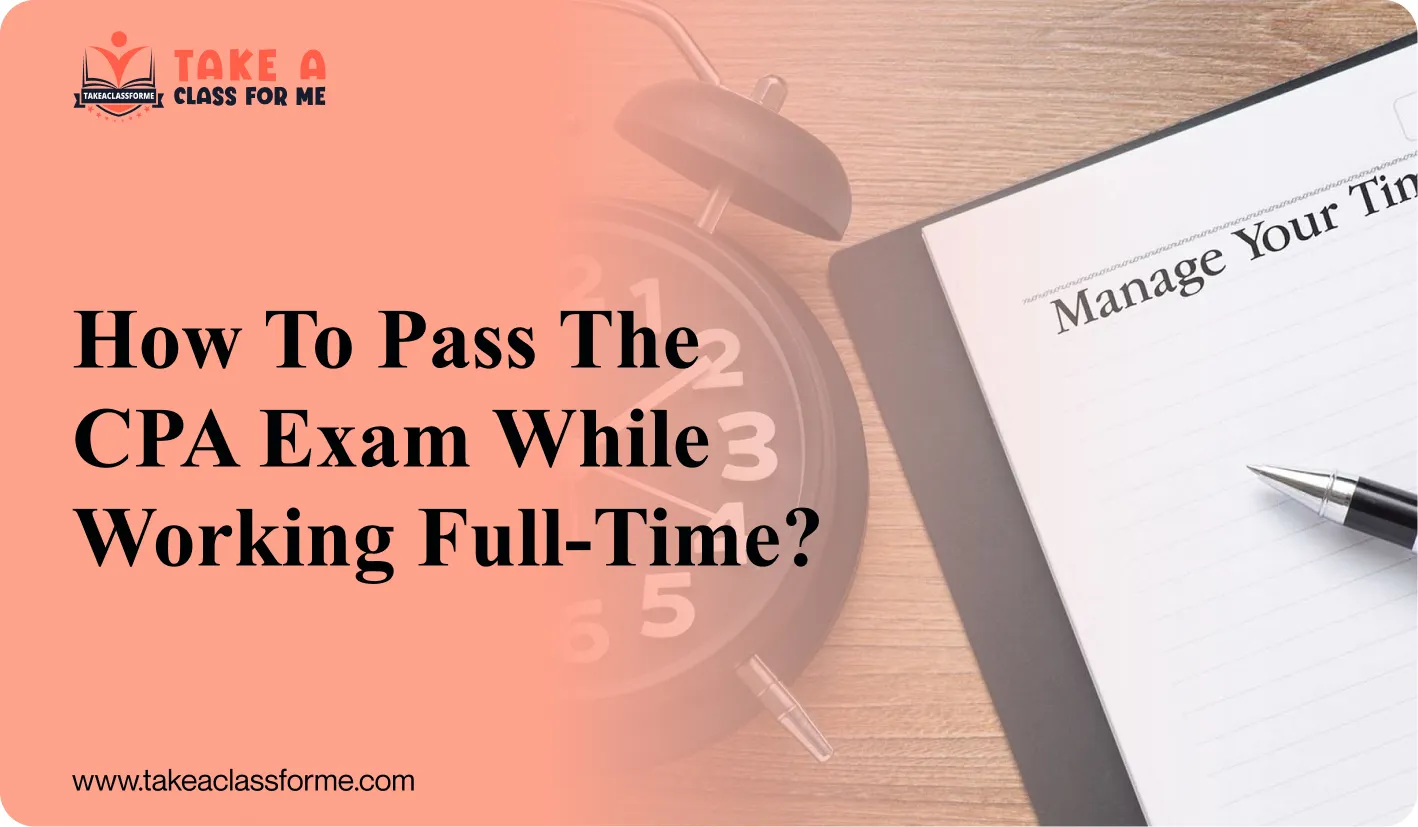
Reaching New Heights: Mastering the CPA Exam
The CPA, also known as Certified Public Accountant, is a licensed exam you need to pass to become a CPA in the United States. The exam checks whether or not the candidate has the necessary skills to practice as a public accountant.
Passing your CPA exam might feel like standing at the base of a massive mountain, the peak dimmed by the clouds of coursework and work deadlines. Climbing which might be a daunting task but the view from the top promises breathtaking visuals of career advancement and professional prestige.
The CPA exam isn’t just about adding a few credentials to your name, it is much bigger than that. It is your personal Everest, challenging but rewarding. It offers you a buffet of choices and opportunities for career growth and leadership roles.
Wondering how to pass the CPA exam while working full-time? It is difficult to pass a CPA exam while having a briefcase in hand but with the right strategy, you’ll crack it in no time. Check out the blog to know how you can do that.
Understanding the CPA Exam Requirements:
Passing a CPA exam is akin to a rigorous journey where clarity and precision are the tools you should never let go of. To successfully pass the exam, you need to know the structure, format, and eligibility criteria — especially if you are balancing work and CPA exam preparation.
CPA Exam Structure and Format
A CPA exam is divided into four main sections, each designed to test different skills related to accounting;
- Auditing and Attestation (AUD): The section tests whether you have the required auditing skills essential for auditing processes.
- Business Environment and Concepts (BEC): It tests a broad range of business concepts such as economic principles and financial management.
- Financial Accounting and Reporting (FAR): It requires candidates to have a deep understanding of financial principles and reporting practices.
- Regulation (REG): This section tests your knowledge about laws and ethical regulations.
Scoring and Timing
Each section of a CPA exam uses a score of 0 To 99, 75 being the minimum passing score. Each section is 4 hours long which totals to a 16 hour exam.
Educational Requirements
It is mandatory in most states to complete at least 150 credit hours of college coursework. This usually includes;
- Securing a bachelor’s degree in accounting or any related field such as finance or business. A bachelor’s degree is of 120 semester hours.
- You need to complete an extra 30 semester hours in accounting, business, or any related coursework. This is done to complete the license requirement of 150 semester hours.
Experience Requirements
Candidates must fulfill the following experience requirements too;
- They need a minimum of 1 to 2 years of experience under a certified CPA.
- Some states may make it compulsory to submit documents such as employer letters or affidavits to prove your experience.
Why is challenging for full-time workers?
Here’s why balancing a study schedule for CPA exam with a full-time job becomes a real challenge for many;
Time Constraints
Managing a crowded calendar full of deadlines is no joke especially when you have to make room for studies. It is like straddling between two worlds and conquering neither. CPA exams require you to set apart a substantial amount of time for preparation but studying between work shifts can be challenging for professionals.
Use brief study sessions such as mornings or lunch breaks to study effectively if you are unable to assign proper time to the studies.
Work-Life Balance
Not being able to manage time effectively is just one aspect of it, there’s more to it than meets the eye. Failure to manage work with studies disrupts personal relationships and may also disturb daily commitments.
Devise a schedule that fits all your priorities and helps you eliminate such stresses from your life.
Mental and Physical exhaustion
Working a full-time job with a CPA preparation might result in mental and physical fatigue which can decrease your level of productivity.
Be aware of the signs of fatigue such as irritability, decreased motivation, or concentration, and address them before they take over you.
Inconsistent Study Time
Full-time employees are committed to companies that may have irregular demands or unexpected work requests. Such disturbances can interrupt the planned study schedule.
Seek support from the company you are working for and let them know about the value of the exam. Who knows, they might make some adjustments for you.
Create a Realistic Study Plan
Having a game plan is necessary to conquer the CPA exam with an overwhelming workload. Here’s how you can design a plan that seamlessly fits your schedule;
Assess Your Time Availability
Following are some time management tips for CPA candidates with jobs;
- You have to consider your work schedule while making a study plan. Begin by assessing your daily and weekly schedule and pinpoint the potential times you can designate for your preparation.
- Don’t overestimate yourself and allot realistic time slots for your studies. For example, allot shorter study sessions on working days and longer sessions on weekends.
Set Clear Goals
- Divide your study plan by CPA exam sections—AUD, BEC, FAR, and REG. Set individual goals for each section to prepare accordingly.
- You can set weekly or bi-weekly milestones, such as completing some practice questions or understanding a concept.
Breaking Down Study Material
Let’s face it, you can never digest the whole syllabus in one go nor is anyone capable of completing a syllabus overnight. Here’s what you can do;
- One of the CPA exam study tips for working professionals is that they can chunk down the larger, more complex topics into shorter, more manageable ones. This makes the material less overwhelming and easier to digest.
- Assign these chunks as daily or weekly goals.
Use Active Learning Techniques
- Regularly summarise what you’ve learned in your weekly goals.
- Teach someone the same concept to clear your understanding.
Tools and Resources
- Consider enrolling in CPA review courses, these courses are known to help you through the process of preparation as they provide study materials and practice questions. Some popular options include Becker, Wiley CPAexcel, and Roger CPA Review.
- Make use of video lectures or practice exams present online.
- Use apps like Gleim CPA Review and UWorld Roger CPA Review. As you can access them through the phone, these apps can accommodate your busy schedule with ease.
Time Management Tips for CPA Candidates
Some essential tips for passing the CPA exam while working;
- Start by creating a task list which should include your job-related tasks and responsibilities.
- Use the Eisenhower Matrix to put tasks into categories of urgent and important, important but not urgent, urgent but not important, and neither urgent nor important.
- Use specific blocks of time for each activity like studying or relaxation.
- Set priorities for each week. Review and adjust at the end of the week.
- Utilize lunch breaks, early mornings, and weekends for short study sessions.
- Set short-term and long-term goals based on the amount of time each task will take to complete.
- Reward yourself with breaks and keep yourself motivated and focused.
Study Strategies That Work for Busy Professionals
For professionals with a tough working schedule, choosing the right strategy can make all the difference. Try out these tactics if you are a busy professional;
Active and Passive Study Techniques
- Passive Study Techniques: Passive study techniques are those with less interaction and more observation. These include reading textbooks, watching videos, and listening to lectures. This technique promotes less retention and engagement with the course material.
- Active Study Techniques: Active study techniques are comparatively more engaging and promote long-term retention of concepts, this may include solving practice questions, summarizing content, and teaching to others.
Both techniques have their advantages and disadvantages, and each aligns with the individual learning preferences of the students.
Incorporating Practice Exams and Quizzes
Here’s how incorporating practice exams can work for you;
- Practice exams and quizzes mimic the exam environment which is why incorporating them into your schedule can bring better results.
- They help you get accustomed to the format and timing of the exam. This familiarity will eventually reduce your exam anxiety.
- Taking practice exams familiarizes you with the areas that need more attention.
Tips on Retaining Information
One frequent issue every student faces is retaining information for a longer period. While studying might be easy for some, keeping the information locked in the brain is a challenge for many particularly when balancing work and CPA exam preparation.
- Regularly test yourself by recalling the key concepts.
- Keep reviewing the study material at spaced intervals of time.
- Use memory aids including mnemonics, visuals, or acronyms for better retention.
Balancing Work, Life, and CPA Preparation
Finding equilibrium in a life overloaded with work and CPA preparations is tough. You need to find the right approaches that can clear the path for you and make this journey easier.
Start with a Proactive Approach
- Open Dialogue: There’s no need to hide anything from your employer. Be honest and tell him about your CPA preparation and how it may impact your work schedule.
- Highlight Benefits: Your employer will be interested in the value the CPA exam can bring to the company. Highlight how CPA certification will benefit the company by equipping you with the skills and expertise they need.
Request Flexible Arrangements
- Adjust Work Hours: Propose a schedule that fits your study schedule without compromising the work responsibilities. See if the company can adjust working hours for you.
- Consider Remote Work: If possible, consider the option of working remotely. Working from home provides you with a quieter environment for studying.
- Be Open To Compromise: Negotiate and be ready to compromise. For instance, say yes to overtime when possible or amid less extreme study sessions.
- Managing Stress and Avoiding Burnout:
It is very common to fall prey to stress and burnout when preparing for a CPA exam which is why going through essential CPA exam study tips for working professionals is a must.
- Practice Mindfulness: Engage yourself in practices that ease your mind such as meditation, breathing exercises, or yoga.
- Engage in Hobbies: Make sure to take some time for the activities that you enjoy. Can be anything you like from reading to hiking, the list is endless.
- Avoid Overcommitment: Be mindful of your limits and don’t overload yourself with tasks. It will only increase your stress.
- Prioritize Quality Sleep: Sleep for at least 7-9 hours as it can work wonders for you.
Conclusion:
Congratulations! You are on a wild ride of balancing work, life, and studies, all together! It may seem overwhelming right now, but following these strategies with planning and perseverance will make this journey a lot easier for you.
Hello our future CPA superstar! We know that balancing work and studies is like juggling flaming torches on a roller coaster. If you are overwhelmed by the amount of coursework or simply fear you might not be able to bring an A in your online accounting exam, Take A Class For Me is here for you.
If you are thinking can I pay someone to take my online accounting exam, you are thinking in the right direction! We can take your online accounting exam for you and bring in the A you are drooling over.
So relax and let us be your torch in the dark cave! Sign up now!
Expert Assignment Writer
Hi everyone! Hello there, My name is Emily, and I provide Online Class Helper services in Los Angeles. Who says balancing between work or school by meeting and final tasks, and having a busy social life? I discovered “Take A Class For Me” when I couldn’t effectively manage the rigors of an online business management class. They were so helpful with our online class whether it be with tutorials or assignment submissions. I can now devote time and energy to a job, but I do not have to sacrifice academic performance for it.






